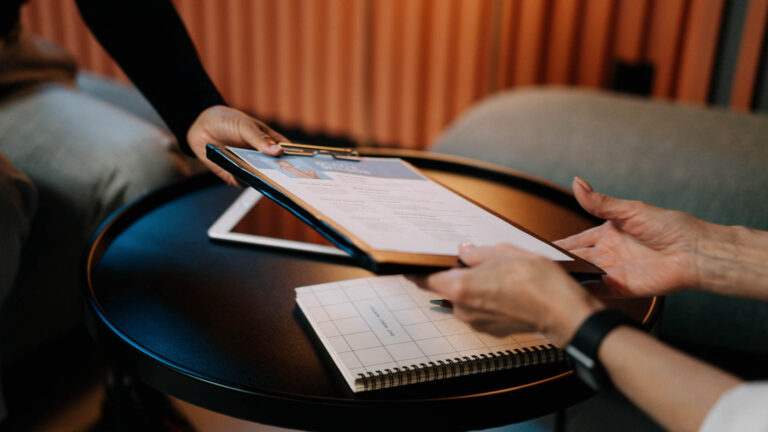As a job seeker, you may already know that the job interview is a crucial step in the hiring process. It’s your opportunity to showcase your knowledge, skills, and experience to the employer and convince them that you are the ideal candidate for the position. However, the competition for jobs is fierce, and it’s not enough to simply meet the job requirements and answer the interviewer’s questions correctly. To stand out from the crowd and increase your chances of getting the job offer, you need to leave a lasting impression in the interviewer’s mind.
In this article, we’ll discuss the strategies and tips that you can use to leave a lasting impression in your job interview. We’ll cover everything from the preparation stages to the interview process itself, and we’ll provide you with practical advice that you can apply to any job interview. By the end of this article, you’ll have a better understanding of the importance of leaving a lasting impression and the tools to help you succeed in your job interviews.
The purpose of this article is to help job seekers like you improve their interview skills and increase their chances of getting the job. We understand that the job market is competitive, and it can be challenging to stand out from the crowd. That’s why we’ve compiled the best advice from recruitment experts, hiring managers, and successful job seekers to help you shine in your job interview. So, whether you’re a recent graduate, a seasoned professional, or a career changer, this article is for you.
Throughout the article, we’ll cover the following topics:
- Why leaving a lasting impression is important in a job interview
- How to prepare for your job interview
- What to expect during the interview process
- Strategies for answering common interview questions
- How to handle challenging interview situations
- Tips for following up after the interview
We’ll also share real-life examples from job seekers who have successfully left a lasting impression on their interviewers and landed their dream jobs.
So, let’s get started and learn how to leave a lasting impression in your job interview!


Preparing for the Interview
Preparing for a job interview is a critical step in landing your dream job. It involves extensive research and practice to increase your chances of leaving a lasting impression on your potential employer. The following are some essential tips to help you prepare for the interview.
Researching the Company and the Role
Researching the company you are interviewing with is one of the most crucial steps in preparing for the interview. It helps you understand the company’s values, mission, and culture. Besides, it helps you determine if the company is the right fit for you.
To conduct your research, visit the company’s website, read their mission statements and company values. Check out their social media pages and news articles that mention the company. It gives you an idea of the company’s vision and what they stand for, helping you prepare better for the interview.
Additionally, researching the role and its responsibilities can help you understand what challenges the company faces and their expectations from the role. Knowing this information prepares you to ask targeted questions during the interview.
Anticipating Common Interview Questions
Anticipating common interview questions is another way to leave a lasting impression. It helps you answer questions concisely and confidently. Some of the most common interview questions include:
- Why do you want this job?
- Tell me about yourself.
- What are your greatest strengths and weaknesses?
- What experience do you have in this field?
- Why should we hire you?
Preparing for these questions enhances your confidence during the interview. Anticipating them also helps you structure your responses while highlighting your strengths.
Perfecting Your Elevator Pitch
Your elevator pitch is a brief but powerful summary of who you are, your skills, and experiences. Perfecting your elevator pitch helps you leave a lasting impression on your interviewer.
To perfect your elevator pitch, focus on answering the following questions:
- Who are you?
- What do you do?
- What skills do you have?
- What value can you bring to the company?
Ensure that your elevator pitch is concise, memorable, and unique. Practice it until you can deliver it effortlessly.
The key to mastering a job interview is adequate preparation. By researching the company and the role, anticipating common interview questions, and perfecting your elevator pitch, you increase your chances of leaving a great impression on your potential employer.
Dressing for Success
When it comes to job interviews, dressing professionally is always recommended. Your attire plays a significant role in creating the right first impression. Here are some general tips on professional attire:
General Tips on Professional Attire
Dress appropriately for the industry and job you are applying for. Do some research and find out the dress code for the company.


Avoid flashy outfits or anything too revealing. Keep it simple, clean, and professional.
Always make sure your clothes are clean, pressed and well-fitted.
Wear comfortable shoes. Avoid anything too high or too casual.
Keep accessories and jewelry minimal.
Don’t forget to groom your hair, nails and overall appearance.
Dressing for Specific Industries
Different industries and companies have their dress codes, and it’s essential to follow them. Here is some guidance on what to wear for various industries:
Corporate
When it comes to a corporate job, dressing conservatively is key. Men should wear a suit and a tie, while women should wear a pantsuit, dress or skirt suit. Neutral colors such as black, grey, navy or brown are recommended.
Creative
In creative fields, such as advertising or marketing, attire can be more relaxed. You can add some personality to your outfit by incorporating trendy accessories or unique patterns. Men can wear a blazer and dress pants, while women can wear a dress or skirt with a blouse.
Healthcare
In healthcare, clothing should be functional and comfortable. Scrubs or lab coats are standard attire. Make sure to wear comfortable shoes as well since healthcare professionals are constantly on their feet.
Retail
In retail, the dress code varies depending on the brand. Neutral colors like black, white, and grey are recommended. Men can wear dress pants and a button-up shirt while women can wear a blouse and pencil skirt.
Hospitality
In hospitality such as hotels or restaurants, the dress code is typically formal. Men should wear a suit or dress pants and a collared shirt, while women should wear a dress, skirt or dress pants with a blouse.
Dressing for success is an essential part of job interviewing. By following some of these tips on professional attire, you can make a great first impression and secure that job. Remember to research the dress code in the industry you are applying for and adapt accordingly.
Demonstrating Confidence and Poise
During a job interview, it’s essential to demonstrate confidence and poise. Your body language and vocal techniques play a significant role in making a lasting impression.
Body Language Do’s and Don’ts
Here are some body language do’s and don’ts to keep in mind:
Do’s
- Maintain eye contact with the interviewer
- Sit upright and avoid slouching
- Keep your hands on the table or in your lap, but not in your pockets
- Mirror the interviewer’s body language
- Smile and nod to show engagement
Don’ts
- Cross your arms, as it can be interpreted as defensive behavior
- Fidget or play with your hair, clothes, or pen
- Avoid eye contact or stare too intensely at the interviewer
- Lean too far back or forward, which can indicate disinterest or aggression
By following these body language do’s and don’ts, you’ll project confidence and calmness, which will make you stand out from other candidates.
Vocal Techniques for Strong Communication
Using the right vocal techniques in an interview can make a difference in how you communicate and leave a lasting impression on the interviewer. Here are some techniques to consider:
Pace and Tone
- Speak at a moderate pace, not too fast or slow
- Vary your tone to avoid sounding monotone
Pronunciation
- Ensure that you speak clearly and articulate your words
- Avoid fillers like “um,” “ah,” “like,” or “you know”
Volume
- Use an appropriate volume based on the situation, not too soft or loud
By using these vocal techniques, you’ll come across as confident, informed, and articulate.
Overcoming Nervousness
It’s challenging to stay calm during an interview, especially when you’re nervous. Here are some tips to fight your fears:
- Practice, practice, practice. Practice your answers to common interview questions with trusted friends or family members.
- Take deep breaths before the interview to calm yourself
- Focus on the interviewer’s questions, not on your anxiety
- Remember to smile and be yourself
By following these tips, you’re sure to feel confident and poised during your job interview.
Demonstrating confidence and poise is key to leaving a lasting impression on your job interview. Use the right body language, vocal techniques, and overcome your nervousness, and you’ll be sure to stand out as the best candidate for the job.
Highlighting Your Skills and Achievements
When it comes to standing out in a job interview, highlighting your skills and achievements is crucial. This not only shows the interviewer what you bring to the table, but it also helps establish your unique selling points as a candidate.
One way to showcase your skills is by mastering behavioral interview questions. These types of questions focus on your past experiences and how you handled certain situations. By answering behavioral questions with specific examples, you demonstrate your abilities and problem-solving skills.
In addition to behavioral questions, it’s essential to provide specific examples of your achievements. This not only highlights your skills but also provides evidence of your past successes. When sharing achievements, it’s important to quantify them whenever possible. For instance, instead of saying you “increased sales,” mention that you “increased sales by 20% in a six-month period.”
When communicating your unique selling points, it’s important to focus on what sets you apart from other candidates. This can include your skills, experience, and personality traits. As you prepare for your interview, consider what makes you unique and how it can benefit the company. Then, be sure to weave these selling points into your responses throughout the interview.
Highlighting your skills and achievements is essential to leaving a lasting impression in a job interview. By mastering behavioral interview questions, providing specific examples of your achievements, and communicating your unique selling points, you can stand out as a top candidate.
Asking Effective Questions
Asking questions during a job interview is crucial for leaving a lasting impression on your potential employer. It shows that you are engaged and interested in the position, while also giving you the opportunity to learn more about the company and the role. Here is why asking effective questions is important:
The Importance of Asking Questions
By asking questions during an interview, you show the interviewer that you are curious, knowledgeable and have done your research about the company. This can help you stand out among other applicants who might not take the time to learn more about the company or the position. Asking questions also enables you to better understand the job’s requirements and expectations, as well as the company’s culture and values. Furthermore, it allows you to determine whether the job is a good fit for your skills and interests.
Types of Questions to Ask
There are different types of questions you can ask during a job interview. Open-ended questions are great for starting a conversation and getting insightful answers from the interviewer. Closed-ended questions, on the other hand, provide straightforward answers that can clarify things you may not understand about the role or the company. Some of the questions you can ask include:
- What are the company’s goals and mission?
- What are the preferred skills and experience for this position?
- Can you tell me about a typical day in this role?
- What challenges does the company face, and how can I contribute to solving them?
- How will success be measured in this role?
Common Mistakes to Avoid
Asking questions during an interview might seem straightforward, but there are some common mistakes to avoid. One is to ask questions that have already been answered during the interview, or those that could easily be found on the company’s website or other resources. It is also important to avoid asking questions related to compensation or benefits early on in the interview process, as this might come off as presumptuous or solely focused on your own interests.
Another crucial mistake to avoid is asking questions that reveal a lack of knowledge or research about the company or the position. Before the interview, do your research on the company’s history, culture, values, and recent news. This can help you tailor your questions to the company’s goals and mission, and leave a positive impression on the interviewer.
Asking effective questions during a job interview is an important way to impress your potential employer and demonstrate your interest in the company and the role. By asking thoughtful questions and avoiding common mistakes, you can make a lasting impression and increase your chances of getting the job.
Building Rapport with the Interviewer
In any job interview, building rapport with the interviewer is crucial in leaving a lasting impression. It is important to show genuine interest and engagement in the conversation, and active listening is one way to achieve this.
Using Active Listening
Active listening is a technique that involves giving the speaker your full attention, listening to understand their message, and responding appropriately. It shows the interviewer that you value their input and are interested in what they have to say. This technique involves:
- Focusing on the speaker and eliminating all distractions
- Avoiding interrupting the speaker
- Asking clarifying questions and rephrasing what the speaker has said to confirm understanding
- Showing empathy and providing feedback where appropriate
By being an active listener during the interview, you can establish a connection with the interviewer and show them that you understand their perspective.
Finding Common Ground
Building rapport also involves finding common ground with the interviewer. This can be achieved by researching the company and the interviewer, finding out what they are looking for in a candidate, and highlighting your skills and experience that match their needs. Finding common ground can also involve identifying shared interests or experiences that you and the interviewer have.
For example, if you discover that you and the interviewer both attended the same university or have a shared hobby or interest, it can be a great way to connect and establish a personal connection. This can help to build rapport and make the interview more enjoyable and memorable for both parties.
Personalizing the Interview
Finally, personalizing the interview is another way to build rapport with the interviewer. This involves tailoring your responses to their specific needs and interests, rather than delivering a generic set of answers. You can do this by:
- Using specific examples and experiences that demonstrate your skills and abilities
- Highlighting how your skills and experience align with the company’s values and mission
- Addressing any specific concerns or questions that the interviewer has expressed
By personalizing the interview, you show the interviewer that you have done your homework, understand their needs, and are genuinely interested in the opportunity.
Building rapport with the interviewer involves using active listening, finding common ground, and personalizing the interview. By doing so, you can leave a lasting impression and increase your chances of landing the job.
Following Up After the Interview
Why Follow Up Is Important
Following up after an interview is crucial in making a lasting impression with potential employers. It not only shows your gratitude for the opportunity but also demonstrates your enthusiasm and interest in the position. A follow-up can also provide an opportunity for you to further showcase your skills and qualifications that make you the perfect candidate for the job.
When and How to Follow Up
Timing is essential when it comes to following up after an interview. It’s essential to strike a balance between showing your interest and being pushy. The ideal timeframe to follow-up is usually within 24-48 hours after the interview. This ensures that you stay top of mind and avoid losing steam in the hiring process.
When it comes to how to follow up, an email is usually the best approach since it’s professional and allows you to express thanks once again for their time. A short and concise message will suffice. Additionally, it’s essential to reiterate your value proposition and how you believe you can be an asset as an employee.
Following Up with Multiple Interviewers
If you’ve interviewed with multiple interviewers or a panel, it’s vital to follow up with each one of them. Firstly, don’t assume they will communicate with one another about your post-interview follow-up. Secondly, it shows your dedication and effort in wanting to stand out amongst other candidates. You can customize each email slightly, but the overall message and tone should be the same.
In your message, mention specific points that each interviewer mentioned during the interview to showcase your attentiveness and engagement. Personalizing each message will demonstrate that you understood their specific concerns or requirements in the job and how you can fulfill their expectations.
Following up after an interview is an opportunity to leave one last positive impression on potential employers. It displays your professionalism, enthusiasm and can help highlight why you’re the best fit for the job.
Example Answers to Common Interview Questions
When it comes to job interviews, there are some questions that are almost guaranteed to come up. While it’s always important to be prepared for anything that might come your way, a little extra prep work can go a long way in making sure that you come across as polished and professional.
In this section, we will be taking a look at some example answers to two types of common interview questions: behavioral and tough.
Sample Answers to Behavioral Interview Questions
Behavioral questions are designed to give the interviewer a better sense of how you would handle certain situations in the workplace. Rather than asking hypothetical questions, they will often ask you to provide examples of times when you demonstrated certain skills or qualities.
Here are a few sample answers to some common behavioral interview questions:
Question: Tell me about a time when you had to work under pressure.
- Answer: In my previous role as a project manager, we had a tight deadline to launch a new product. I knew that the success of the launch was critical to the company, so I made sure to prioritize tasks and delegate responsibilities effectively. By staying organized and focused, we were able to successfully meet the deadline and exceed our goals.
Question: Describe a situation where you had to work with a difficult or challenging coworker.
- Answer: In my previous role as a marketing coordinator, I had a coworker who was often resistant to my ideas and feedback. To build a better relationship, I took the time to get to know her better and understand her perspective. By actively listening and finding common ground, we were able to work together more effectively and achieve some great results.
Example Responses to Tough Interview Questions
Tough interview questions can often catch candidates off guard, but with the right preparation and mindset, they can be great opportunities to showcase your skills and experience.
Here are a few example responses to some tough interview questions:
Question: Why should we hire you over other candidates?
- Answer: As someone who has a proven track record of success in my previous roles and a strong passion for this industry, I bring a unique blend of skills, experience, and enthusiasm to the table. I am confident that I can make a valuable contribution to your team and help drive your organization’s success.
Question: What is your biggest weakness?
- Answer: While I strive to be a perfectionist in all aspects of my work, I have learned that sometimes it’s better to focus on progress rather than perfection. In my previous role as a project manager, I made a concerted effort to prioritize tasks and delegate responsibilities effectively, which helped me to overcome some of my perfectionist tendencies and focus on achieving results.
How to Make Answers Stand Out
While having well-crafted responses to common interview questions is important, it’s also crucial to make sure that your answers stand out from the crowd.
Preparing for Different Types of Interviews
When it comes to job interviews, there are various types that you may encounter. Preparing for each type can help you to feel more confident and increase your chances of leaving a lasting impression.
Phone Interviews
Phone interviews are a common first step in the hiring process. They are often used to screen candidates and narrow down the pool of applicants. To prepare for a phone interview, you should:
- Choose a quiet location where you won’t be interrupted
- Have a copy of your resume and the job description
- Research the company and the position
- Practice answering common interview questions
- Speak clearly and confidently, as your tone and inflection will be the primary way to communicate with the interviewer
It may also be helpful to have a pen and paper handy to jot down notes or questions that come up during the interview.
Video Interviews
Video interviews are becoming increasingly popular, especially with remote work becoming more common. These interviews may take place over platforms like Skype, Zoom, or Google Meet. To prepare for a video interview, you should:
- Test your equipment (webcam, microphone, internet connection)
- Choose a quiet and well-lit location with a neutral background
- Dress professionally and avoid distracting or revealing clothing
- Get familiar with the video platform and its features
- Maintain good eye contact and speak clearly
- Avoid multitasking, like checking your phone or email, during the interview
Remember, your body language and facial expressions will also be visible during a video interview, so it’s important to maintain a positive and professional demeanor.
Panel Interviews
Panel interviews are typically used for higher-level positions and may involve multiple interviewers from different departments or levels within the company. This can be an intimidating experience, but there are ways to prepare:
- Research the interviewers and their backgrounds
- Get familiar with the company culture and values
- Practice answering questions that may come up from different perspectives
- Ask for the names and titles of the interviewers beforehand, if possible
- Prepare questions to ask the interviewers based on their roles or departments
During the interview, make sure to address each interviewer by name and maintain good eye contact with everyone in the room. It’s also important to stay calm, confident, and focused on your qualifications and experience.
By preparing for these different types of interviews, you can increase your chances of making a strong impression and landing the job. Remember to do your research, practice, and present yourself in a professional and confident manner. Good luck!
Related Articles
- Write an Irresistible Motivation Letter: Tips and Examples
- Sales & Marketing Executive Resume Example &: Complete Guide
- Sample Reference Letter from an Employee’s Manager for 2023
- Game Design Resume: Sample & Writing Guide for 2023
- Marketing Resume: Examples and Guide for 2023




